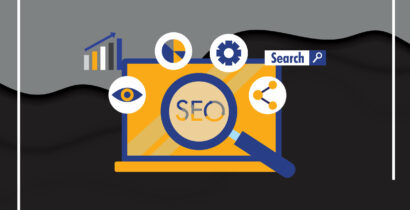
Why Is SEO Important in 2024?

SEO stands for search engine optimization, and it is one of the most important aspects of digital marketing. The goal of SEO is to improve your brand’s online visibility and increase organic traffic to your website. It can also help your brand’s reputation, drive sales, and much more.
To help you understand why is SEO important, we will first show you the basics of SEO and show you how it works. Furthermore, we will also include several tips and tricks and show you how you can use SEO to improve your website and, ultimately, your business as well.
How SEO Works and Why Use SEO?
Whenever we use the internet to browse the web, we use a search engine, such as Google, Bing, Baidu, or Yahoo. We type in something in the search bar, hit enter, and the search engine displays the results. Of course, the search engine doesn’t just throw any results at us. Instead, every search engine tries to match search intent with the content relevant to the information the searcher is looking for.
To ensure the right results are delivered to the searcher, a search engine relies on an algorithm that uses a number of ranking factors to determine in which order the results are going to be displayed. For example, in the case of Google, its algorithm uses more than 200 different ranking factors.
Depending on what you search for, you may get hundreds or even thousands of different results. However, Google displays only ten search results per page, and the higher you rank, the better your chances of getting more organic traffic. In fact, based on the latest digital marketing trends, 75% of people never scroll past the first page, and as much as 60% of searchers only click on the first top three results.
In other words, ranking high in the SERPs is extremely important for your business, which is why SEO is essential for any digital marketing strategy.
Why Is SEO So Important for Companies?
As you can see, ranking high in the SERPs translates to more organic traffic. For a business, additional traffic to your website means more opportunities to introduce new people to your product or your services. To put it simply, SEO can help you generate more leads, increase sales, and improve revenue, which is ultimately the goal of every digital marketer.
Of course, there are plenty of other aspects SEO can help you with and why so many digital marketers already use it. For example, SEO is easy, has great ROI, and it can also help build your brand’s credibility.
How Can a Business Optimize Its Online Business Presence?
The first thing you should know about SEO is that it encompasses a variety of different practices. Based on that, there are three different types of SEO: on-page SEO, off-page SEO, and technical SEO.
One thing to remember is that all SEO types are important. Therefore, you shouldn’t invest all of your eggs in a single basket but rather create a strategy that divides your efforts and focuses on each type of SEO equally.
Why Is Technical SEO Important?
As the name suggests, technical SEO includes all the technical aspects of your website, and there are plenty of ways you can work on your technical SEO.
One of the first things you should do to improve the technical SEO of your website is to ensure your website is crawlable. We mentioned earlier that Google uses more than 200 factors to determine page rankings.
To do that, Google relies on software known as crawlers. Crawlers scan all the pages on your site and assess their relevance. If your pages aren’t crawlable, crawlers cannot index them, which means that any uncrawlable page won’t appear in the search results.
In addition, you should ensure that your website is responsive and has a mobile-first design. In today’s time, more than 50% of all internet traffic comes from mobile phones, which is one of the reasons Google values mobile-friendly websites. Not only that, but mobile-friendly websites will appeal to a broader audience.
Lastly, you should make sure that your website is easy to navigate, loads fast, and is tightly secured. Namely, user experience plays a big role in digital marketing. If your website takes ages to load, there is a high chance a potential lead will simply click out of the page and look for information someplace else. In contrast, by offering a seamless user experience and an easy-to-navigate website, you will significantly reduce bounce rate and increase dwell time.
On-Page SEO Benefits
On-page SEO is the process of optimizing individual pages for search engines and users. In the world of SEO, content is king, and the first step of optimizing content begins with keyword research.
By researching and using keywords, you help crawlers understand what your content is about and why it is relevant to the searcher. To help you get started, you can check out our list of SEO tools and find one to your liking. The good news is that plenty of SEO tools are free to use, so you won’t have to even spend a penny.
Of course, researching keywords is only half the job. The more important part is knowing how to use the keywords to your advantage, how frequently to use them, and more. For example, rather than jamming all the keywords in one or two paragraphs, you should make sure they are strategically placed throughout the post. As far as frequency goes, a good rule of thumb is using one keyword every 80 to 150 words.
When it comes to optimizing content, it is just as important to properly format your titles and any other headings, such as H1 or H2 tags. Not only will it make the content more readable, but it is yet another factor that helps crawlers understand what your content is about.
While we have covered only the basics, there are a ton of other aspects you can do to improve your on-page SEO. However, the most important thing to remember is that you should create relevant, meaningful, and unique content.
Off-Page SEO Benefits
Off-page SEO involves everything that happens away from your website and directly benefits your website’s rankings. The goal of off-page SEO is to improve your domain’s authority. By doing so, search engines will deem your website more credible and trustworthy, which will help you rank higher in the SERPs.
Link building is the most important aspect of off-page SEO. With on-page SEO, you are free to link to any source or page, whether you are linking to a page on your website or to another domain. However, with off-page SEO, you don’t actually have control over who links back to your website.
The best way to earn backlinks is by publishing exceptional content. That way, other domains are more likely to link to your content and cite information from it. Additionally, you can earn backlinks through outreach. By doing so, you can create content for a different domain and include a link that leads back to your website.
Another creative way you can earn backlinks is by using SEO tools that connect you with journalists or publishers. If any of them require a bit of information, data, or a statistic on your website, you can easily contact them through an SEO tool and earn a backlink.
An important thing to remember is that not all backlinks are created equal. Namely, while the number of backlinks to your website is important, the domain authority of the website linking to you is even more significant.
In addition to link building, you can employ off-page SEO through influencer or social media marketing, creating on-page content to earn backlinks, and even working on your local SEO.
Why Local SEO Is Important for Your Business
The importance of local SEO for your business will depend on the type of product or services your business has to offer. However, if you run a local store or you wish to optimize for a specific city, state, or location, then local SEO is the way to go.
Optimizing for local SEO is rather similar to traditional search engine optimization. Well, for the most part, at least. If you have a website, you should ensure it is well structured, has fast loading speeds, and is mobile-friendly.
When it comes to content, you should generally try to optimize for the so-called near me or around me searches. After all, people who perform a local search are usually looking for the business in their vicinity.
More importantly, you should focus on updating your Google My Business information. About 80% of users who search for local businesses use the search engine to do so. At the same time, you should ensure that any citation that includes your business’s name, address, and phone number (NAP) is up to date.
Importance of SEO in Digital Marketing: The Takeaway
SEO is undoubtedly the most important aspect of digital marketing, and it can significantly increase organic traffic to your website. With about 80% of users completely ignoring paid advertisements, it doesn’t come as a surprise that many businesses are prioritizing SEO for their digital marketing campaigns.
SEO presents businesses with an opportunity to reach a broader audience. Not only that, but SEO can help you nurture leads and convert potential leads into buying customers, thus increasing your revenue.
So, now that you know why is SEO important, all that’s left to do is create an SEO campaign of your own. If you have the time and the experience, you can do most of the work yourself. However, if you would rather focus on the business at hand, you can always hire a digital marketing agency that will do all the heavy lifting for you.
While it may take some time to see the fruits of your labor, SEO has a variety of long-term benefits. Because of that, you should work on your SEO campaign diligently and always look for new ways to optimize your website and create unique content.






There are currently no comments.
Be the first!))